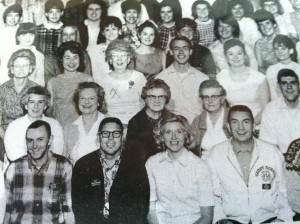Standing at the base of something as big as Mt. Rainier can seem overwhelming and impossible, but lessons learned there can help us navigate the realities of life and leadership because you don’t climb a mountain with a leap; you climb it step by step. Here’s what I mean:
Taxes. Job stress. Family dysfunctions. Broken appliances. Big decisions. Illness. Car problems. Commuting stress. World news. The sum of all this is stress, and unless it’s dealt with the stress itself will become a gigantic problem of its own as the chronic challenges conspire to create even more anxiety and health issues. This isn’t a treadmill because at least on a treadmill you arrive back where you started. A deluge of paralyzing stress leads you instead down a path to oblivion. You don’t want to go there.
When you’re overwhelmed, though, you will go there if you try to solve everything at once because it’s too much – there are too many variables. Move one piece of the puzzle and it has implications on all the other pieces so that, after a frenzy of considering possibilities, you collapse exhausted, overwhelmed, into a pile of sleepless weariness. It happens – to all of us. The good news, though, is that there’s always, always, a way off that path, a way back to peace, and hope, and joy. Interested?
1. Don’t be surprised by such seasons. The reality that we live in a broken world is undisputed and all the careful planning or simple living in the world won’t exempt you from seasons that are challenging, beyond anything you’d imagined. We faced a summer a few years ago where there was death around every corner, starting with my father in law, and ending with a friend who was a pastor on staff at the church I lead. Besides death there were other unwelcome cords woven into the fabric of our lives, including a heavy teaching schedule for me, and other personal challenges.
Then fall came, and we entered a season of peace. I’m reminded that nothing stays the same and that as one of my favorite authors says, “There’s a time for everything” after which he articulates a long list of dualisms such as life/death, joy/sorrow, scatter/gather, laughter/mourning. We nod our heads. We get it. It’s just that during those seasons when the dark side of those dualisms seems to appear in every area of our lives we find ourselves in over our heads. This too is a season and it will pass. But we’d better learn how to live wisely in the midst of it, or our choices will lengthen it, or take us into even darker places.
The way out of this dark forest always needs to include two things:
2.Take it to the Source. In several places we’re reminded of just how important this is. We’re told that we need be “anxious for nothing” because if we bring our concerns to God in prayer, “the peace of of God will guard your hearts and minds in Christ Jesus”. There’s no way around this. You might have heard the saying, “measure twice – cut once” as a way of reminding us that by simply committing our way to Christ through prayer, we’re taking a giant leap forward on the peace front.
Since prayer is dialogue though, it’s true that the peace we’re offered comes not as some mystical anti-anxiety drug, as if Jesus magically infuses our emotions with some magical calming sense. Rather, the peace comes most often in the form of wisdom. We’re invited, after all, to ask for wisdom whenever we need it, and to ask believing that we’ll be given wisdom in response our asking. It’s like asking your parents for more vegetables. You know they won’t say no.
3. Listen for “next step” directions. But in our asking for wisdom, let’s understand that the wisdom we receive from God will often come to us wearing a disguise. For example, sometimes a multiplication of options and problems can overwhelm and paralyze us with indecision. We ask for wisdom, thinking that what God will give us is some sort of grand map, or master plan so that we, having been privy to a few secrets regarding the future from omnipotent God, can make the right decisions.
This isn’t what God gives us though. He nearly always gives us a simple “next step” to take. For Abraham, “leave your country” is all God says, without telling him exactly where he’s going, how long it will take to get there, and what kind of challenges and adventures he’ll encounter along the way. He just tells him to go. For the rich young ruler, “sell everything you own and give it to the poor”. For Naaman the leper, “Go take a bath”. Over and over again, there’s no revelation of a big plan or big vision or final solution; there’s just a next step.
So a man goes on a mission trip. It was planned to be two weeks. It was a next steps. Twenty years later he’s still there. Or an architecture student decides that he gets more energized by building in people’s lives than he does by designing structures, so he changes majors, having no idea that such a step would eventually land him as a senior leader in a big urban church.
The same principles apply when we’re overwhelmed and can’t see around the corner. We still need to listen for the voice of Christ (and that implies having an ongoing relationship with Christ) and then taking the next step. Christ speaks to us through his scriptures, through conviction, and through the council of those whose wisdom we trust. Hearing from Christ, though, is critical to the process because we who follow Christ desire to do exactly that: follow Christ. Without revelation from Christ we can busy, trying hard to do the right things – but we’re on our own, and to the extent that we’re on our own, we end up missing the peace that comes from simply hearing, trusting, and stepping out.
4. Take the next step. Of course none of this works if we refuse to take the next step. That’s often the crux of it, because the step Christ has for us is more often than not counter-intuitive. “Give some stuff away” “Speak that word you don’t want to speak” “Serve over there” “Say yes (or no) to that opportunity” when the answer you want to hear is no (or yes). It can be challenging to ask for wisdom from God, but the reality is that if we ask, God will eventually show us a next step.
Wisdom is learning to trust in that next step and focus all our energy there, rather than getting worried about a thousand “what if’s” that might happen. “Let the ‘what if’s’ take care of themselves”, is something Jesus said in his own way once. He said it because he loves us and wants us to be people of peace, people who are able to sleep at night because we’ve come to believe that the future isn’t in our control anyway. All we need to worry about is the next step.
The first time I climbed Mt. Rainier, I was chopping along and my world had been reduced to two simple steps, repeated over and over again. Step. Rest. Repeat. I’d gotten into a rhythm, had a headache and a bit of nausea, didn’t know when, or even if, I’d make the summit. Then the guide said, “this is it – the summit!” and I looked around on the top of my world realizing that I didn’t get here by autonomous decision making, or even a personal clear vision of the path, but simply by following the guide; step by simple step.
It’s a strategy that’s helped me send anxiety running away many times in life, and I hope you’ll apply it. Today!











